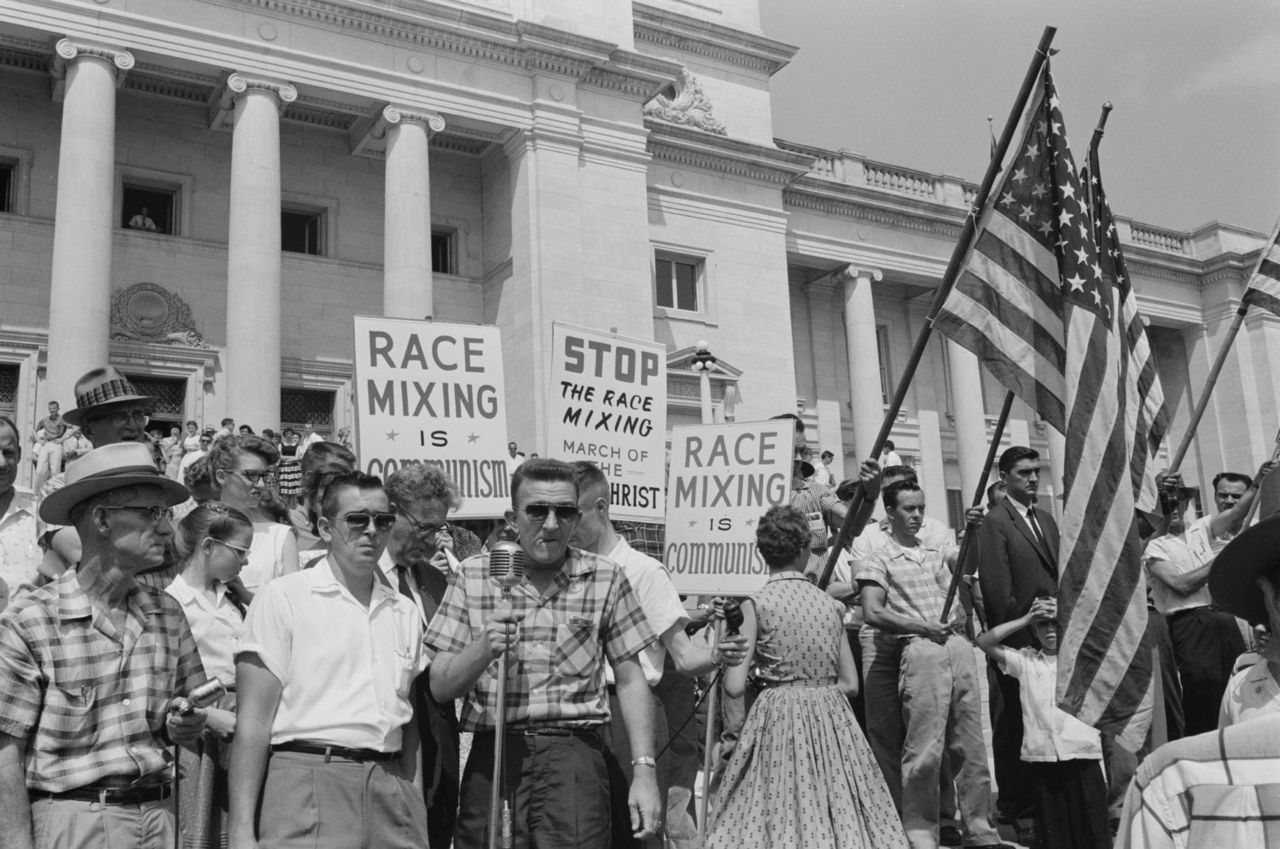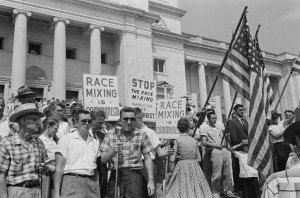They were marched into the classroom, single file, and lined up along the blackboard to face the roomful of white faces. It would be sheerest invention to say I remember everything about that day. The only things I recall had to do with questions about how my own situation was about to change. Thinking back, though, I can recall, without remembering a single one of their names, a general tension transmitted between the two groups. Groups clearly being treated as groups. And the expressions I saw were not the excited faces of new students but the suspicious faces of new problems.
Negroes. Or, as we sometimes said in 1962 St. Louis, Nigras. (One of the ironies of growing up was that if we used the vulgar euphemism in the hearing of adults we were punished for it, even though it was in common usage among those same adults. They treated it much like cussing, which was a privilege of adulthood. The lesson, clearly, was that a child did not have a right to indulge the language of racism. This was something we could look forward to, like being able to say shit and damn and, though we didn’t yet know the word, fuck without being cuffed by an adult.)
I want to say there were about a dozen of them. Transfers. Kids our age—2nd grade—but different. Alien. I’m not sure any of us had ever been so close to a black person before then. I know I hadn’t. I only saw them on tv or in a movies, occasionally on the street somewhere as we drove by. My entire childhood experience till that day had been with caucasians, and it hadn’t been entirely wonderful at that. Since moving abruptly from kindergarten to 1st grade (after a scant month in school, because my birthday is in October) my “school experience” had become one of daily misery. People who speak glowingly of the innocence of children have forgotten or lived under such unimaginably ideal circumstances as to be from another planet. My peers quickly identified me as weak and easily bullied and so began several years of torment. It’s possible that I looked on these new arrivals with some perverse hope that maybe the bullies would pay attention to them and leave me alone. (There is a short story by Frederik Pohl called The Day The Martians Came which speaks eloquently to exactly this.)
What I do remember is the suspicion in their faces. All of them. From appearances they were not happy to be there. They were unwillingly subjects in a great social experiment and though they probably could not have understood it that way they surely knew they were being used. In any case, they had no choice.
Neither did we. I say “we” as though I were actually part of the other side of this encounter, and I suppose I felt that way, because although I was singled out for “special” attention I never questioned my status as part of the class, part of the group, part of—well, part of society, and that society was clearly defined for me by every marker available. I didn’t know enough then to label that mass of received messaging, it was like the air, you breathed it in and it sustained you, because how could you not? You couldn’t say “I don’t want to breathe this air, I want to breathe that air over there” but on the way, even if you tried, you still had to breathe, and this was the air that was available, and it did its job, it filled your lungs and let you live. But even so, there was no way for us to imagine that we needed to breathe different air. If we thought about it at all, the question would have been “Why don’t you breathe the same air?”
Presentation is powerful. They marched those kids into class. Class was interrupted, which only happened when something Important was about to happen. We had to Pay Attention. It was a spotlight being shone on these new arrivals and they were lined up in a way I would later identify as a police line-up, made to face us, who were all still sitting at our desks, so we could get a good look at them and recognize that this was different, they were different, the situation was different. We were being told to accept them, that we had no choice, that these were new students. Told. But we were being shown that these were not kids. They were problems. They might be kids one day, if they passed some test they were clearly being tasked to pass, but we didn’t know what that might be. Oh, we had tests among ourselves (one of the reasons I was on the outside of all the in-groups, my inability or disinterest in these tests), the passing of which gained you privileges with your peers. The rules were known. Baseball, cars, later on pop music, and a vague interest in matters military. Trading cards were big. We all were supposed to Just Know, and if you didn’t, you were weird and not to be trusted. But the test these kids would have to pass, no one knew what that would be. What could it be? But the lines were drawn, that morning, by the principle, the teacher, the entire edifice of St. Louis public education that had decided that rather than just let them in to find a desk like everyone else had done, they had to be escorted in like prisoners, and displayed with a kind of ceremony which designated them as, from day one, not like us.
That line, invisible though it was, persisted. They played among themselves, they sat in a group, they went home together. I don’t recall a single black kid joining the cub scout troop. It was easier for me, in retrospect, to blame it on them not wanting to be a part of us. I did not for a long, long time make the connection to the way I was bullied and the way they were ostracized, labeled, even though it was right in front of me. Why? Because maybe if I had made that connection I would have been forced to choose sides. And what if they didn’t accept me, either? As it turned out, I did get beaten up by one of them, but it was different than any other time. My beatings and tauntings were always public, in front of others, but this one time I found myself in the cloak room alone with my assailant. His name was Percy and I had to escape him rather dramatically. Later I understood—if he had tried to do that like everyone else, he would have been beaten, probably by several white boys, who would have taken exception to him presuming to beat up a white boy. But it set up one more barrier for me that took a long time to die. Curiously, Percy is the only one of all of the black students whose name I remember.
I only attended that school for another year or so and then transferred to a private school where there were no black students until 6th grade and they didn’t last long.
I grew up aware of the divide and for years unable to understand it other than as a conflict between sides. The historical nature of the conflict occupied one part of my brain, but the other part, the emotional part, refused to budge. I made excuses, offered explanations to myself, went along with the ingrained attitudes with which I had grown up, though always uneasily, and every time I was presented with a chance to praise, to see exceptionalism, I took it, never quite questioning the standard I was using to judge. To say someone, some group, is “just like me” is in itself a barrier. A very soft, mushy barrier that on its surface seems like a step forward, an opening of boundaries. But “just like” denotes a difference because it makes a comparison. It’s not the same as saying “he is me” or “we are the same.”
What began then took me nearly two decades to unlearn and I’m still working on it, because there are always new groups held up as Other, who don’t rate, who aren’t “like us,” who won’t assimilate, who fail the (false) comparisons (of course, because how to not fail in the face of a lie?).
But that’s what we did back then. We made comparisons. Who’s better, worse, just like, completely different, less, more? Us and Them is a game played in the nursery. Partly it’s an identity builder, but it also erects walls and fences.
Like that morning when I came face to face with what I was being told not to trust by the very mechanism of introduction. We didn’t question why they were on the other side of the line that had been drawn. Even if we had, we couldn’t then understand that that would still be the wrong question. We didn’t have the stuff yet to ask why there had to be a line at all.
Thus is racism nurtured.



